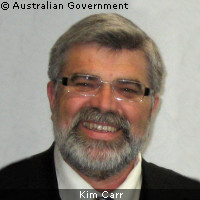Australia sets out its case for hosting next generation telescope
'Australia offers some very unusual, perhaps unique characteristics,' said Australia's new Science Minister, Kim Carr, when asked why his country should host the Square Kilometre Array (SKA) telescope. The Minister was talking to CORDIS News during a trip to Europe to discuss the SKA, as well as the new Australian government's wider science and innovation policies with his European counterparts. Australia is competing with South Africa to host the SKA, which the European Strategy Forum on Research Infrastructures (ESFRI) describes as 'a machine that transforms our view of the Universe'. The radio telescope will consist of a vast array of antennae, arranged in clusters over an area of over 3,000 kilometres. With it, astronomers will be able to study the formation of the early universe and search for life on other worlds. A final decision on its location will be made towards the end of the decade. 'We have a good basis to suggest that centring it in the north-west of Australia, in an area that has unique features in terms of radio quiet, in a country that is advanced technologically, stable politically, and has extensive experience in the building and the management of major infrastructure projects puts us in a unique position,' stated Minister Carr. 'The fact that we are able to have one country effectively manage an area of some 3,000km is quite a significant matter,' he continued, adding that Australia is also working with New Zealand with the goal of turning it into an Australasian bid. 'If that occurs, we could deploy this infrastructure across a distance of some 4,000km.' he explains. Travelling with the minister was the astronomer Brian Boyle of CSIRO's (Commonwealth Scientific and Industrial Research Organisation) Australia Telescope National Facility. He explained that Australia excelled in both optical and radio astronomy. 'Australian astronomers have been at the forefront of many major discoveries in astronomy,' he said, citing the nature of the accelerating universe, measuring the mass of the universe and the discovery of unique systems like double pulsars as examples. He believes that the key to Australia's success is international collaboration. 'All Australia's telescopes are open and available for anybody to observe with,' he said, pointing out that observing time is given on the basis of scientific merit on its own. 'It's by encouraging our overseas collaborators to use our facility that also elevates Australia's astronomy in the world's eyes.' For the Minister, the benefits of hosting the SKA are clear. 'There are clearly major benefits to come in terms of not just scientific discovery for humanity but obviously in terms of Australian opportunity to have our best and brightest work with the world's best and brightest,' he commented. Other plus points include the opportunity to develop Australia's industrial capabilities and enhance its supercomputing infrastructure. Meanwhile the Minister is keen to see Europe and Australia collaborate on other projects. 'For us the expansion into Framework Seven activities is something the government's pursuing,' he said, adding that the government would be both promoting Australian science abroad and encouraging Australian scientists to take up opportunities as they present themselves. Another priority for the new Australian government is a wide-ranging review of the country's innovation system. Issues covered by the review include the relationship between basic and applied research, the IP system, technology transfer and how to promote a more innovative mindset in the country. Other areas of focus include the training of new researchers and support for young and mid-career researchers. The new government is also keen to encourage creativity among researchers and encourage them to speak up on controversial issues. Early indicators are that Australia's research community is positive about the directions the new government is taking. 'They are encouraged by the new government's approach to openness, and the fact that we're not frightened of new ideas,' Minister Carr stated.
Countries
Australia



